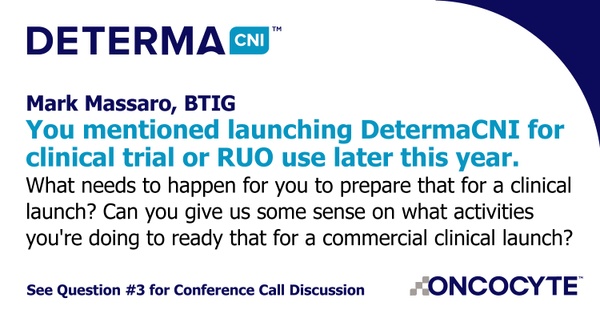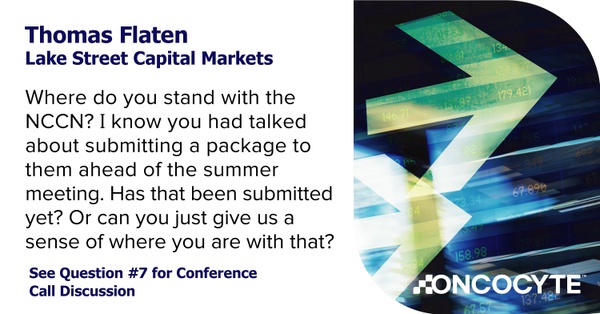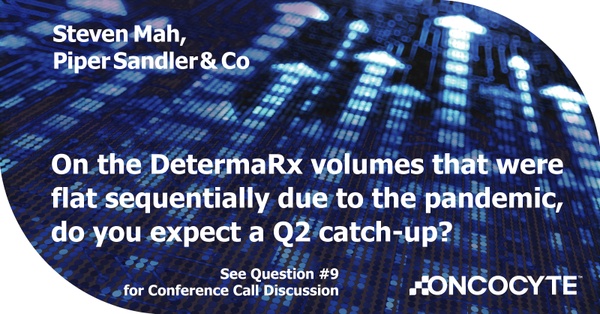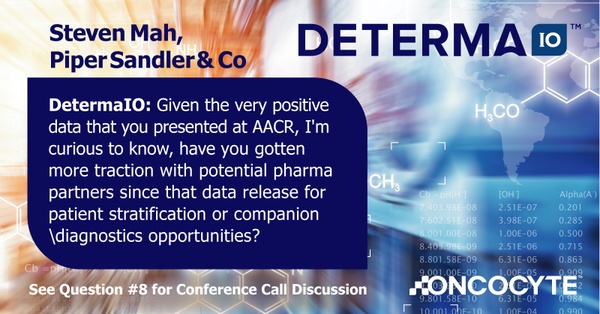Ronald A. Andrews - CEO, President & Director
It's great to be able to report that despite the ongoing macro environmental headwinds, team Oncocyte has continued to maintain our solid momentum into 2021 with steady execution across our 4 growth engines, bringing us closer to our goal of delivering a single solution for physicians and their patients that will answer critical unanswered questions for the management of solid tumors.
The technologies and tests we've integrated over the past 7 quarters have the potential to improve patient outcomes while also reducing the cost of care and allow Oncocyte to execute commercially in markets that, when combined, have over $10 billion worth of TAMs.
Key accomplishments so far this year include recording our first $1 million revenue quarter; presenting compelling data on DetermaIO in our third solid tumor type at AACR; initiating pilots with 4 pharma companies for DetermaIO; signing major agreements with 2 of the largest molecular platform companies to provide clinical reference testing and validation services across PCR and Next Gen Sequencing platforms, and that will be done out of our Nashville lab.
We acquired Chronix Biomedical, giving us access to IP and technology that allows us rapid entry into the blood-based monitoring world in cancer as well as a high-value reimbursement product for transplant rejection. And finally, we significantly strengthened our balance sheet to support our ambitious growth brands.
Our growing product portfolio positions Oncocyte for both immediate-term revenue generation and long-term growth. And I would like to spend the call today providing an overview of our most recent accomplishment and what's to come across these 4 areas.
To recap for any of our new investors, first, we have DetermaRx, the first and only commercially available predictive test for informing chemotherapy decisions in early-stage lung cancer. We believe our second test, DetermaIO, is the star of our future as a potentially differentiated and proprietary test for immune therapy response prediction that will give oncologists and patients greater understanding of the likelihood responding to an immune checkpoint inhibitor at the beginning of the disease management process to ensure the patient gets the right treatment from the very start, giving them the best chance at a good outcome.
In a very short period of time, we built a compelling foundation of data, demonstrating applicability of this test across all 4 approved immunotherapies: Keytruda, Opdivo, Tecentriq and Imfinzi; and across 4 different indications: lung, breast, bladder and kidney cancers, which together suggests the pan-cancer immune therapy opportunity which is on track for clinical launch later this year.
Third is our pharma services offering from our CAP-accredited CLIA lab in Nashville, which continues to grow, generate revenue, which doubled in Q1 as compared to Q4 2020. And we now have a solid pipeline of opportunities with pharma and diagnostic companies.
And finally, our newly acquired CNI test, which accelerates our entry in the blood-based monitoring for therapy response and for recurrence in cancer, where we intend to replicate our successful DetermaIO development playbook for the TheraSure CNI moderate test for immunotherapy response monitoring. Together, our progress across these 4 growth engines will enable Oncocyte to become a one-stop shop offering DetermaRx, DetermaIO and eventually, DetermaCNI, as proprietary tests that position Oncocyte to become the preferred lab for clinicians who need answers to the important treatment decisions only Oncocyte's test can answer and do that throughout the patient journey.
So, let's dive into some of the details on each of the product offering. Q1 was a solid quarter for DetermaRx, particularly given the COVID surge in late January and February, which we now know led to substantial delays for early-stage cancer surgeries, with patients waiting for vaccines and instead relying on radiation treatment until they felt it was safe to undergo surgery.
We've continued our sales efforts to expand to new health systems. And as of the end of the first quarter, we had a total of 129 onboarded systems, which represents a 57% quarter-over-quarter growth. As of March 31, 2021, we had 218 onboarded physicians, a 57% quarter-over-quarter growth rate and we completed testing on 236 patient samples in Q1, slightly ahead of Q4, with sample numbers growing every month in the quarter.
We expect that as COVID cases continue to decline with the expansion of the vaccine programs, patients will be more comfortable seeing their doctors and undergoing these life-saving surgeries. The improving macro environment, combined with our steady growth with onboarding new doctors in hospitals, leave us confident that as our reps can reengage with physicians in person, we'll be able to strengthen our momentum and see increased quarter-to-quarter growth in DetermaRx patient orders in Q2 and throughout 2021.
Our agreement with Burning Rock to distribute DetermaRx in China is progressing as planned. Our continued progress to complete full onboarding and validation in late Q3 leaves us on track for $4 million in booked revenue from Burning Rock in 2021. And it's just the beginning of our efforts to tap into the world's largest early-stage lung cancer market.
Moving to our second growth engine, DetermaIO, where the new data being presented continues to validate that our test is the only precision diagnostic test on the market that evaluates the entire immune microenvironment in biopsies and surgical specimens to identify patients likely to respond to immune checkpoint inhibitors. We believe DetermaIO is poised to significantly improve treatment decisions for individual patients and their physicians as well as help focus development process of biopharma and pharma companies in clinical validation of a new emerging class of immune therapies.
It is clear that the opportunity with DetermaIO is tremendous given more than 750,000 patients will be eligible annually for immune therapies in the U.S. alone. Identifying which of these patients will benefit from ICIs remains an outstanding challenge.
At the recent FDA Oncology Drugs Advisory Committee meeting, where they reviewed retrospective data from the accelerated approvals in the immunotherapy drug class, the committee stated that only modest benefits were observed across diverse and often unselected patient populations. That is why we believe we not only have a tremendous opportunity in guiding clinical immunotherapy treatment decisions, we believe there's also a huge opportunity to inform the estimated 5,000 ongoing clinical trials evaluating these types of drugs.
The past few months have been data rich. We steadily provided compelling evidence that DetermaIO has broad potential across a range of tumor types, starting with well-established clinical data across 3 different cancers: lung, breast and bladder. Most recently, at the AACR meeting, we presented our first studies in bladder cancer, where we achieved our primary end point, demonstrating significant correlation between DetermaIO and 2-year overall survival rate to Atezo in metastatic breast -- bladder cancer, demonstrating improved overall survival in DetermaIO-positive patients versus the all-comer population, where the drug had been voluntarily withdrawn due to lack of survival benefit.
Our message is resonating with pharma, and we currently have several pilot studies underway, where DetermaIO is being used to analyze samples from ongoing and failed pharma trials for a potential rescue opportunity. By selecting those most likely to respond, we may be able to help pharma reveal the true benefit of treatment in the right patient population. These pilots have definitive end points and if we hit them, we'll be poised to rapidly enter trials that could lead to a companion diagnostic claim that could broaden and accelerate DetermaIO's clinical adoption.
So, with strong data in triple-negative breast cancer, lung and bladder cancer, we booked a solid case that DetermaIO may have pan-cancer utility as a biomarker for many solid tumor types. We're excited to build on this data set with the new results that will be presented at ASCO in early June, where we'll expand to a new indication, renal cell carcinoma. Every new cancer indication moves us closer to being the only precision diagnostic that can accurately predict sustained response across all solid tumors and builds a case for DetermaIO as a pan-cancer predictive test in the $3 billion immune therapy patient selection market. And importantly, we remain on track for clinical launch second half of this year.
Next, I would like to spend some time on our newest product, the TheraSure CNI monitor clinical assay, our entry in the blood-based monitoring in cancer. We recently closed the acquisition of Chronix Biomedical, which provides Oncocyte proprietary access to the TheraSure CNI monitor clinical assay, a patented blood-based assay that uses copy number instability, or CNI, for immunotherapy response monitoring in oncology.
As I said earlier, we'll apply the same playbook we successfully used with DetermaIO this time last year, rebranding the test as DetermaCNI and preparing for market with planned validation studies and publications to support a U.S. research and pharma services launch in late 2021. In the near term, though, we've established a clinical study plan for DetermaCNI, and we'll complete tech transfer to our lab in Nashville and start marketing to pharma companies in the U.S. later this year.
However, we've hit the ground running with the Chronix team, who already have ongoing studies in Europe in multiple cancers, including lung, head and neck, ovarian and pancreatic, with over 700 patients recruited to date across several studies. Data from studies to date had demonstrated broad utility of this blood-only test across 3 areas of monitoring: one, predicting the presence of minimal residual disease post-surgery; two, predicting recurrence in ovarian cancer that is in remission; and of course, three, predicting response to cancer treatment, including, but not limited to, immune therapy treatment.
We believe the CNI test has a number of advantages for patients and physicians. First, it will allow physicians to begin monitoring patients for treatment efficacy more quickly given that the CMS test requires only a blood sample. In contrast, getting a result from the competing emerging test for monitoring can take significantly longer as these tests start with the time-consuming and costly genetic sequencing of a patient's tissue sample.
In several late-stage solid tumors, such as lung, guidelines recommend neoadjuvant therapeutic intervention, not surgery, which means the pathology for these tumors is performed on a fine-needle biopsy, which typically collects very little tumor tissue. So, in many cases, the initial pathology will use the majority of the tumor tissue and doesn't leave enough to complete the full genome or exome testing required to run a tissue informed MRD methodology.
Even in cases where sufficient tissue is available, preserving precious sample to enable other tests will be an added benefit of Oncocyte's fully blood-based approach. In addition, we believe the CNI test will be able to deliver timely results on progression at the second cycle of immune therapy, which is weeks earlier than currently seen with imaging or the tissue-informed technologies.
From an overall strategic perspective, TheraSure CNI monitor assay will not only help us expand in the projected $3 billion and growing immunotherapy response monitoring market, it will also provide us ownership of IP that could help develop a foundation to build additional applications for the estimated $6 billion-plus recurrence monitoring market, a repeat testing opportunity that tells a patient that a second tumor may be forming long before it can be identified by imaging.
These additions bring Oncocyte a distinct competitive advantage as the first and only company to potentially offer a continuum of tests from selecting patients for immune therapy, to monitoring the effectiveness of treatment as well as monitoring for recurrence.
The Chronix acquisition was also important in that it included test and a patent state for the use of digital PCR to detect transplant rejection in recipients. The Chronix TheraSure transplant monitor test is a solid organ transplantation monitoring test intended to use a simple blood draw to monitor for rejection of transplanted organs. Excitingly, Palmetto, the Medicare administrative contractor for the Centers for Medicare and Medicaid Services, or CMS, recently issued a local coverage determination, or LCD, recognizing molecular testing for solid organ allograft rejection as a category test eligible for Medicare reimbursement. This LCD creates a pathway for future Medicare reimbursement for the TheraSure transplant monitor test in the organ transplant space.
Of note, the coverage policy for transplant rejection monitoring molecular testing for solid organ allograft rejection, as it's titled, exclusively cites 3 peer-review publications on the performance of the Chronix test in solid organ transplant monitoring, which is an important validation of the Chronix technology. In addition, the policy establishes a price point out of $2,700 to $2,800 per test, depending on the organ transplanted, which we estimate could translate to total revenues of $40,000 to $50,000 per patient over a 2- to 3-year time frame, assuming current transplant monitoring guidelines are followed.
While we will explore licensing in the TheraSure transplant monitor to potential partners for use in the transplant field, the underlying technology may be of interest to Oncocyte's core cancer-related assay business. We believe there's an opportunity for the use of technology in the development of a super sensitive test to detect tumor-derived DNA in blood to monitor for long-term cancer recurrence, which will ultimately become DetermaMX and complete our continuum of application.
Although our focus was made in oncology, this LCD per transplant use, along with the key attributes of this technology, including greater sensitivity, reduced cost to run and most importantly, the ability to kit and democratize the monitoring test to improve turnaround times, makes this a highly attractive asset for players in the transplant diagnostic market.
And finally, coming to our fourth growth engine, our pharma services business. We currently have a solid and growing pipeline of contracted pharma services projects. And while we know, traditionally, these revenue streams can be lumpy and directly related to project timelines and sample delivery from our pharma partners, we -- I would like to enthusiastically report that pharma services revenues did double quarter-over-quarter.
Another noteworthy accomplishment in pharma services was the Q1 initiation of a project from a very large study by a top 20 pharma company using our proprietary blood-based cell cycle assay for monitoring resistance in our pharma partner's Phase III trial. It's the first major trial using this test, which was developed in-house by our team in Nashville specifically for this indication.
And finally, we're thrilled to announce agreements with 2 of the largest molecular platform companies. Our work with these 2 global leaders will focus on clinical validation and system integration of selected tests on their respective PCR or Next Gen Sequencing systems. These 2 agreements will begin to bear fruit in late Q2, and we look forward to working closely with these 2 large strategic partners. And of course, there's more to come, but the progress in growing the client base and projects in pharma services provides an immediate and growing revenue engine to help smooth out the lumpy quarterly revenue ramp traditionally experienced when building a pharma services business. As well, these relationships with global platform companies will support our operations as well as our strategic development of future tests for our sales channel and potentially provide a partner for kit development and distribution ex U.S.
As I look out in the rest of 2021, I envision a great year with rising revenues and at least 3 product launches: DetermaIO, DetermaTx and DetermaCNI. These products have a large total market opportunity of over $10 billion, and we have proprietary positions in some of the fastest-growing areas of molecular oncology. We're beginning to attract the attention of leading pharmaceutical, biopharma companies and molecular diagnostic tool platform providers. And we are bullish on our opportunity to complete important contracts with these global partners to strengthen our market position.
Question and Answer
Michael Stephen Matson
Needham & Company, LLC, Research Division
(Regarding) the 3 DetermaIO pilot projects with the pharma companies, can you tell us any more about these? And how long does that pilot phase last before they were going to more of a regular phase?
Douglas T. Ross
Chief Science Officer
These are pilot projects where it varies. Sometimes, it's in a silo project. Sometimes, it's a small wet project of samples or data that they have available. And it's really a period of getting introduced to us, into the assay. And then it hopefully progresses to the next stage, where we would be part of a prospective study or a larger retrospective study. So, it's the natural progression of a relationship with somebody who's getting to know you, your assay, and quite candidly, pivoting what is usually an existing biomarker strategy. So that's the first stage.
Padma Sundar
Chief Commercial Officer
What's very interesting and exciting about these pilot projects is that with biopharma companies, they are actually developing novel therapeutics. So, they are looking to see whether our biomarker is predictive for these new so-called second-generation therapeutics. So, we believe that if they do see a predictive signal, then to Doug's point, it will pave the path for them to incorporate our biomarker into their program.
Ronald A. Andrews
CEO, President & Director
Yes. I think the main thing to note, Mike, is the reason they're pilots is because both pharma and us want to get to a go or no-go decision point rapidly. And so, by the sheer nature of them being pilots, we have -- or the studies are geared towards fast turnaround time of the results so we can get to an answer for them and for us.
Mark Anthony Massaro
BTIG, LLC, Research Division
Okay. And you guys talked about launching DetermaCNI for clinical trial or RUO use later this year. What needs to happen for you to prepare that for a clinical launch? I'm guessing it's data and reimbursement. But can you give us some sense on what activities you're doing to ready that for a commercial clinical launch?
Ronald A. Andrews
CEO, President & Director
Yes. Absolutely, Mark. First off, when we acquired CNI and we actually -- the deal was done, we got a wonderful surprise in the fact that they had already had numerous studies ongoing in Europe. And we have over 700 patients now enrolled across a number of different tumor types for CNI. And so, the critical mass and speed at which we can gain critical mass and statistical -- powering these indications is obviously enhanced by the work that they were doing, and now we've been able to invest to ramp that up.
Douglas T. Ross
Chief Science Officer
We are doing a tech transfer in Q4 over to the U.S. to facilitate work that goes on in this country. And we're also -- the early trial that we're doing, the prospective trial that we're doing is going to be done in Europe, starting this summer out of the European lab. And so, we want to aggressively expand that into the U.S. And so having that running out of our Nashville facility is the plan. And to move it towards commercial launch, we're trying to drive -- do clinical studies in a single clinical indication where it's very clear what the actionability of it is. And that's the plan to drive it towards a commercial launch.
Padma Sundar
Chief Commercial Officer
And the reimbursement path, we've had initial discussions, is actually quite straightforward in that there's already a local coverage decision, as you know, Mark, very well for blood-based monitoring tests. So as long as the next test is equivalent in performance to that first step, it is covered under that policy. So, once we have the data demonstrating equivalence to the first test of the market, the coverage is -- it's, in a sense, automatic. And the data shows a couple of things. Obviously, it's blood only, which is a great source of differentiation. And second, it's broad. It's not just for immune therapy response prediction, it's for treatment response prediction, which includes immune therapy. And in some cases, where the standard of care is chemotherapy, it includes response to that as well as some early data in MRD. So, it's a pretty broadly applicable asset.
Ronald A. Andrews
CEO, President & Director
I don't want to let too much of the good news out of the bag here because it's not -- it hasn't been formally blessed yet, but we have a paper that has been accepted by a very prominent journal around using our CNI assay as a monitor for progression of ovarian cancer as a very specific monitor of progression. And it's -- so far, the data looks significantly better than the current protein biomarkers that are being used for monitoring for ovarian cancer. So, lots of good things coming out of the CNI acquisition, and we look forward to bringing those to market.
Steven Mah, PhD
Piper Sandler & Co., Research Division
So really quick on DetermaIO. Given the very positive data that you guys presented at AACR, I'm curious to know, have you gotten more traction with potential pharma partners since that data release for patient stratification or companion diagnostics opportunities?
Ronald A. Andrews
CEO, President & Director
Yes. So, these pilot -- these 4 pilots that we are now engaged with came from sort of the -- a byproduct of the data that we've been releasing this year. And we have a number of other conversations ongoing as well. But those 4 were directly related to the data that we've shown year-to-date. And so obviously, with ASCO coming in a few weeks and another indication around renal cell carcinoma, we're hopeful we'll continue to gain momentum. But we're very hopeful with these 4 pilots that, as soon as they're completed, they will lead to some more substantial relationships and potentially the CDx we're looking for.
Steven Mah, PhD
Piper Sandler & Co., Research Division
Given the 3 new test launches, can you give us some thoughts on the sales force hiring cadence ahead of those 3 launches?
Ronald A. Andrews
CEO, President & Director
Yes. I'll let Padma go into detail if you're interested. But the reality is, right now, the goal is to add some new territories as we enter Q3, preparing for the launch. But we also -- there's also some creative opportunities we might have as well, where we might have some indications in certain areas of therapeutic, where we might get some support from one of the pharma companies. So, working on that, but I think you will see some growth in the sales force probably Q3. And you will probably start to see the expense impact in Q4 though.
Padma Sundar
Chief Commercial Officer
One thing to add is several of our sales reps already have deep connections with oncologists treating lung cancer, thanks to DetermaRx. So, as we think through adding headcount, we will consider the fact that in some geographies, we already have sales reps with deep connections with lung cancer oncologists. So, we don't need to necessarily replicate a sales rep in that area. So, we'll be very judicious in how we think about adding sales reps.
Ronald A. Andrews
CEO, President & Director
As well as we've seen real success in adding medical education headcount as well. Because this is -- Rx, but even more so with IO, is going to be a fairly doc-to-doc or scientist-to-scientist discussion. And so, as the reps go in and generate the open-door opportunity, having support folks that can go in and get deep
down into the science and answer the medical questions will be helpful as well. So, you'll start to see some increase in that area as well.
Paul Richard Knight
KeyBanc Capital Markets Inc., Research Division
Could you talk to the fact that you had 60 million covered lives added, what, on Rx in the quarter? And where are you in total covered lives now?
Ronald A. Andrews
CEO, President & Director
Yes. So, for Rx, obviously, CMS was our big fish there. We got that already. Multiplan is our first private payer. So...
Padma Sundar
Chief Commercial Officer
So, if you added that up, the Medicare and Medicare Advantage is 70% of the 40,000 lives already covered. So that's 28 million. And then Multiplan, in general, has 60 million covered lives, but it's -- so that's another incremental for their population. That would probably -- that is not a very high volume for Rx, maybe several hundred thousand would be [my bet on] Rx.
Ronald A. Andrews
CEO, President & Director
Yes. So, we're probably somewhere in the low 70s of total number of covered lives. It's a great question, Paul. But we are working, as you might imagine, on getting all because we're getting paid by some of the private payers, but they're paying very slow. As you might imagine, we're having to fight for every penny. That's the nature of that world. So, we would love to get in there.
We hired a -- we went -- in Q1, we hired a professional from that area. He has great experience, and we're already seeing the benefit of that. So, part of the beauty of what Mitch has done to help strengthen our balance sheet is to be able to go and get some of these key players that we needed on the field to help us in some of these key areas. So...
Padma Sundar
Chief Commercial Officer
So, we're targeting the plan that has -- where we have the highest number of claims. And so, we're going back to them and saying, "Now we have enough claims in your population, can we contract with you?" So that's the strategy. So, we're targeting 3 to 5 top payers and hope to get -- with the goal of getting the test under contract at a price similar to Medicare, which is what we did successfully with Multiplan.
Bruce David Jackson -The Benchmark Company, LLC, Research Division
I wanted to see if we could dig into the press release where you mentioned you initiated a project utilizing the proprietary blood-based cell cycle test for monitoring resistance in the Phase III trial. Can you maybe tell us what you're monitoring the resistance of? And what is the test application? And how do you envision the test result being used?
Ronald Andrews
Yes. You know what, it's a sales cycle assay that basically looks at, in blood, Ki67, and the proliferation rate post-therapeutic intervention. It's a large European pharmaceutical company. It's a Phase III trial. We developed the assay for them. We are excited about the opportunity to be in our first CDx. We hope we have many more of these but -- in DetermaIO in the future.
Oncocyte is a precision diagnostics and monitoring company with the mission to improve patient outcomes by providing clear insights that inform critical decisions in the diagnosis, treatment, and monitoring of cancer. The Company, through its proprietary tests and pharmaceutical services business, aims to help save lives by accelerating the diagnosis of cancer and advancing cancer care. The Company’s tests are designed to help provide clarity and confidence to physicians and their patients at every stage. DetermaRx™ identifies early-stage lung cancer patients who are at high risk for cancer recurrence and who may benefit from adjuvant chemotherapy. DetermaIO™, a gene expression test currently used as a research-use only tool, assesses the tumor microenvironment to predict response to immunotherapies. The Company’s pipeline of tests in development also includes DetermaTx™, which will assess the mutational status of a tumor; blood-based monitoring test DetermaCNI™, and long-term recurrence monitoring test DetermaMx™. In addition, Oncocyte’s pharmaceutical services provide companies that are developing new cancer treatments a full suite of molecular testing services to support the drug development process. DetermaRx™, DetermaIO™, DetermaTx™, DetermaCNI™ and DetermaMx™ are trademarks of Oncocyte Corporation. Keytruda®, Opdivo®, Tecentriq® and Imfinzi®, are registered trademarks of Merck, Bristol Myers Squibb, Roche Genentech and AstraZeneca, respectively.
Oncocyte Forward-Looking Statements
Oncocyte cautions you that this press release contains forward-looking statements. Any statements that are not historical fact (including, but not limited to statements that contain words such as “will,” “believes,” “plans,” “anticipates,” “expects,” “estimates,” “may,” and similar expressions) are forward-looking statements. These statements include those pertaining to DetermaIO, including its potential to serve as a predictive biomarker, and companion diagnostic, for immune therapy response prediction; its capacity to work as a companion diagnostic across the checkpoint inhibitor class of therapies and both benefit drug development and add precision to patient treatment decisions; its potential pan-cancer and pan-immunotherapy utility in both primary and metastatic settings; its expected clinical launch in Q4 2021; its potentially unique and pivotal role versus other tests in selecting patients for immunotherapy; its potential to find the right treatment for the right patient with specificity for response; and other statements about the future expectations, beliefs, goals, plans, or prospects expressed by management. Forward-looking statements involve risks and uncertainties, including, without limitation, the potential impact of COVID-19 on Oncocyte or its subsidiaries’ financial and operational results, risks inherent in the development and/or commercialization of diagnostic tests or products, uncertainty in the results of clinical trials or regulatory approvals, the capacity of Oncocyte’s third-party supplied blood sample analytic system to provide consistent and precise analytic results on a commercial scale, potential interruptions to supply chains, the need and ability to obtain future capital, maintenance of intellectual property rights in all applicable jurisdictions, and the need to obtain third party reimbursement for patients’ use of any diagnostic tests Oncocyte or its subsidiaries commercialize, and risks inherent in strategic transactions such as the potential failure to realize anticipated benefits, legal, regulatory or political changes in the applicable jurisdictions, accounting and quality controls, potential greater than estimated allocations of resources to develop and commercialize technologies, or potential failure to maintain any laboratory accreditation or certification. Actual results may differ materially from the results anticipated in these forward-looking statements and accordingly such statements should be evaluated together with the many uncertainties that affect the business of Oncocyte, particularly those mentioned in the “Risk Factors” and other cautionary statements found in Oncocyte’s Securities and Exchange Commission filings, which are available from the SEC’s website. You are cautioned not to place undue reliance on forward-looking statements, which speak only as of the date on which they were made. Oncocyte undertakes no obligation to update such statements to reflect events that occur or circumstances that exist after the date on which they were made, except as required by law.
For more information, please visit https://oncocyte.com/ or follow us on Twitter at @OncocyteCorp, Facebook, and LinkedIn.












